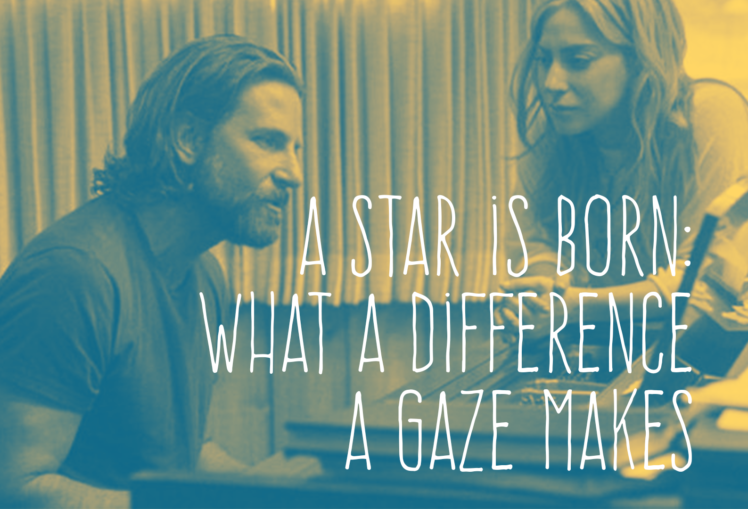Blog

A Star is Born: What a Difference a Gaze Makes
October 17, 2018
by Helen Lee
SPOILER ALERT: some spoilers from the film A Star is Born may follow. So if you were hoping to see it, wait to read this until later!
A new re-make of an old-ish story, Bradley Cooper’s A Star is Born tells the story of human fragility: of our fragile hearts, our fragile egos, and our fragile bodies. And importantly, it tells a story of the redeeming power of a loving gaze, and the crushing danger of gazes that lack love.
Saving Gaze
Ally is a talented singer who has resigned herself and her talents to singing in a drag club, where she’s beloved, and the only female they’d ever let sing there. She’s given up on “making it” anywhere else as a singer before starting, after internalizing the message that she is not the whole package. Thus far in her life, she’s been told enough times that she’s ugly that she believes it.
Ally even utilizes the make up techniques of drag queens to make herself performance ready. The artistry of drag makeup notwithstanding, these techniques are designed to create the illusion of a radically different appearance (as opposed to an augmented or touched up appearance). We learn early in the movie that in order for Ally to be presentable on a stage, she can’t appear to have the eyebrows, hair, or nose she was born with — or so she believes.

But in Jackson Maine, Ally is confronted with a sudden and loving gaze that startles her. He weeps when he watches her sing. When he visits her in her dressing room afterward, he is starstruck — even though everyone else in the room is starstruck by him, the famous singer.

With wonder and curiosity, but without judgment or revulsion, he watches her remove her false eyebrows, interested in the purpose they serve, and hungry to see what’s underneath. When she emerges looking like her true self, his gaze doesn’t change. He sees her in disguise and out, and delights in what he sees regardless.

It is Jackson’s loving gaze that draws Ally out onto the stage for an impromptu performance of a song she’s only created a rough draft of. And once on the stage, it’s Jackson’s gaze that seems to give her the permission she needs to share the voice that she’s been hiding for so long because she’s been told her body is not worth looking at. In beholding her as worthy, beautiful, important, Jackson begins to undo the damage of years of body diminishing messages. As a result, Ally flourishes.

A Death Giving Stare
Tragically and in stark contrast, Jackson seems to have the opposite trajectory of Ally. Plagued with unprocessed grief over the loss of both his parents as a preteen, Jackson has self-medicated for years with pills and alcohol. The introduction of Ally into his life prompts little attempts to get sober, but Jackson’s untreated mental illness is profound. His diminishment of his own body through abuse of drugs and alcohol has been enabled by his brother, everyone close to him, and his entire audience.
Jackson bears in his own body the lie from the world that he does not deserve to flourish in mind or spirit. Never resting, Jackson is accustomed to passing out more than falling asleep, after giving himself to the hungry eyes of everyone who feels entitled to his person. The loving gaze of Ally is a light in his dark, but she cannot single-handedly save him. In fact, the system of enabling around Jackson is so robust, that although Ally knows he needs help, she probably never appreciates how deep his need is until it is too late.

Jackson’s rock bottom comes as the kind of public humiliation none of us can imagine enduring. I had to watch this scene with my hands over my face, peeking through the cracks of my fingers. As Ally accepts the Grammy Award for best new artist, a drunk Jackson joins her on stage in front of the massive Grammy audience in addition to the millions of people watching on TV. He steals her moment, rambling incoherently, and then loses control of his bladder, wetting himself on the stage and collapsing. He goes to rehab soon after this.
Jackson’s return from rehab is loaded with hope. He’s clean and sober. He’s eager to get home. He loves his wife. He loves his dog. But in rehab, Jackson has been protected from the unforgiving stares of the world, and, sober, Jackson is still profoundly grieved and mentally ill. In rehab, Jackson has the support of group therapy and rest to hold him in his now unhidden depression; out of rehab, he faces the same unfiltered and unforgiving, entitled gaze of the world.
One stare in particular seems to confirm Jackson’s crushing sense of worthlessness, and it comes from Ally’s agent, Rez. Rez takes advantage of a rare moment alone with Jackson to tell him that in spite of his work in rehab, in spite of his love for his wife, he will always be a black mark on her career. He will always be an embarrassment to her. The world will always see the humiliated man from the Grammy Awards when he stands next to her. In Jackson’s last moments with Ally he learns that she has decided to cancel her tour. Taking this as confirmation that he is, as Rez says, an insurmountable burden to his wife, Jackson resigns himself then and there to end his bodily life.
Jackson’s brother Bobby asserts later that his brother’s suicide is entirely his own fault. Perhaps it’s true that Jackson died at his hand alone, but can we expect a person to survive in a world that glares at him and calls him worthless? We are so fragile, after all.
You are not the sum of some series of unfortunate events, whether they were seen by only a few, or by the entire world. You are not an embarrassment or a black mark. You are precious and beloved. Your mind and spirit are worthy of flourishing; your body deserves care and is beautiful to behold. You are worthy.

